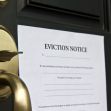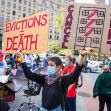President Biden started off his first day in office signing 17 executive orders, one of which addresses the national rental eviction crisis during the pandemic. In the order, President Biden asked the Centers for Disease Control and Prevention (CDC) to extend the current federal eviction moratorium until March 31st. The current moratorium only extends until the end of January.
While extending the federal eviction moratorium for two more months will buy renters some extra time to stay in their homes during the pandemic, it does have some critics asking the question of whether or not the extension is simply kicking the can further down the road. Additionally, as renters struggle to pay their rent, so do many of the small business landlords who depend on that rent to survive.
Renters Struggle to Stay Afloat During Pandemic
Data from the Center on Budget and Policy Priorities highlights that a majority of renters impacted by the pandemic continue to be predominantly minorities, with blacks being hit the hardest. Researchers point to a variety of reasons for this, but the data is consistent that renters who are facing eviction typically have jobs in industries that pay already low wages, many of which were no longer available after the pandemic hit. Also, inequities in education, employment, and access to healthcare have exasperated whether or not renters, especially those from low-income housing, can continue to work to keep up with their rent payments.
The Aspen Institute highlights the reality that the rent crisis existed long before the pandemic. The pandemic simply magnified and sped up the burden. In 2018, nearly 48% of all renters were already burdened by the rental payment, with over 30% of their income going toward their monthly rent. 25% of renters were spending over 50% of their income on rent.
The latest polls show that only 75% of renters made a full or partial payment for December. This is a significant drop from the 83% of rental households who made a payment during the same time last year.
While the rent moratoriums have helped alleviate the burden of renters being evicted if they couldn't pay rent, there is the looming threat of the tsunami of evictions that will take place once the moratorium is over, whether it be the end of January or the end of March. And as the tsunami is set to hit, an estimated 5.8 million households will face eviction once the moratoriums are lifted.
The Washington Post reports that an estimated 12 million renters will owe an average of just under $6,000 worth of back rent and utilities by January. Nationwide, researchers speculate that renters have a cumulative $70 billion worth of back rent at the start of the new year.
While the outlook is bleak for millions of renters, the same goes for landlords, a group in the rent crisis equation that has been ignored.
Landlords Bearing the Burden of Cost
While many landlords and tenants are finding success in negotiating the terms of rental payment with each other during the pandemic, landlords are still missing out on crucial payments that they need in order to keep up with their own property payment.
While earlier state and federal eviction moratoriums did little to protect landlords, Biden's executive order asks federal housing agencies to extend foreclosure moratoriums for mortgages that are federally backed at least through March as well.
As part of President Biden’s America Rescue Plan, Biden is seeking to allocate at least $25 billion in rental assistance to households that qualify as low or moderate-income and have been impacted by the pandemic. While this is a good step forward, critics express it will still hang landlords out to dry, as $25 billion is a fraction of the $70 billion Americans owe in back rent. Biden shares of his rent relief plan, “If we don’t act now, there will be a wave of evictions and foreclosures in the coming months as the pandemic rages on.”
To further complicate the process, once these rent relief funds are distributed, it will be up to the state to process rent relief requests depending on eligibility. This process could take weeks, and funds may not be distributed in time before the rent moratorium is up. Jaime Michelle Cain, an attorney and coalition leader for Under One Room, a group of New York landlords who represent the rental industry in the state, explains, “The idea here is to get the tenant help [in order to] help the landlord.”
Cain adds that the lack of rental assistance at the start of the pandemic has created a burden too big for landlords, and their only option may be to sell their property to make ends meet. Selling their property would make it more accessible for a large corporation to scoop it up, furthering the economic gap between classes. According to the 2015 American Housing Survey, mom and pop landlords own roughly 22.7 million rental units while 25.8 million units are owned by business entities.
Eviction Moratoriums Put Landlords In a Tough Spot
While landlords across the nation are sympathetic to the burden suffered by renters, this fact doesn't diminish their own burden. For many mom and pop landlords, a lack of rental payment due to the eviction moratoriums means a lack of income and often a lack of funds to pay for utilities, maintenance, property taxes, and oftentimes the mortgage on the property itself.
Cleveland attorney Jeff Watson shared with the Rental Housing Journal about the current situation landlords are faced with. “We have gone from unprecedented to crazy,” he said. “What concerns me the most is that this is now creating precedent for future administrations, future agencies, to use this as a rationale, to stop all sorts of economic commerce across the United States of America, any particular form of commerce, any type of interaction, any type of business agreement, (or) consumer agreement that they don’t like.”
Like Watson, many small landlords feel that the government's intentions were well-rooted but have caused a butterfly effect for what could be a disastrous outcome. Many landlords fear the loss of back payment because once moratoriums are lifted, these already-struggling households will oftentimes have no additional reserves to pay for back rent. Furthermore, some landlords highlight the fact that many tenants are hiding behind the moratoriums to keep from paying rent they could afford. In these cases, Watson suggests filing suit for rent payment instead of filing eviction notices, as this practice goes against the CDC federal eviction moratorium guidelines.
While the likelihood of the federal rent moratorium extending through March 31 is certainly a cushion to help ease the burden faced by renters and landlords, the question remains, are the consequences of the moratorium being felt now, or is there another housing crisis looming once the pandemic comes to an end?






